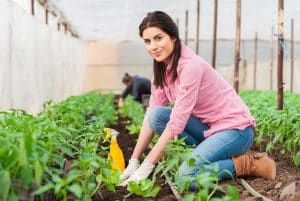One of the most common questions about starting organic gardens at home is how much produce can be grown from them. While it is certainly possible to grow a great deal of food from an at-home organic garden, this kind of farming relies on access to a large variety of fruits and vegetables. Without this, the quality of the end product will suffer. Even with the best of crops, there’s nothing like fresh organic vegetables or fruit to spice up meals. But how can one go about growing organic gardens at home?
The first thing to consider is a good location. This means finding a spot on the property where the plants can grow without interference from structures such as walls or other features. It also means being certain that the spot is actually capable of supporting a garden. Dig a hole, fill with dirt, and lay in soil. The amount of organic matter in the soil will determine the health of the plants.
After the hole is prepared, add some soil, preferably organic soil. Fill in the bottom of the hole with dirt, then rake the soil to make sure that it is even. If the soil is uneven, it will affect the permeability of the soil. It will also attract water runoff, which will wash away chemicals and pesticides before they have time to do damage. Finally, add some fertilizer. A well-rotted compost will work wonders on plants.
Most at-home organic gardens are small, about two feet by two feet. They should be located in areas that get about six hours of sunlight, so that they don’t dry out. A raised bed is a good option for urban dwellers because it allows air to circulate while keeping the plants fairly cool. However, raised beds are rather slow to establish, and they can be difficult to manage when the weather turns too cold. A self-watering planter is a great option for people with very limited space, since it can grow almost anywhere.
For many people, an organic garden provides a healthy supply of produce and other healthy, organic products. Since the products from organic gardens are not sprayed with pesticides or other chemicals, they are safe for consumption. The soil in the organic garden doesn’t need to be as depleted as in traditional gardens, and there is no need for excessive amounts of fertilizer. This means that less fertilizer and more natural minerals can be used to feed the plants. Furthermore, since organic products are grown without using unnatural fertilizers, the soil can retain more nutrients and other valuable substances for future use. This means that when organic foods are offered at a restaurant, they are healthier, tastier, and better for the consumers than those grown using unnatural methods.
Some people wonder if they should grow their own organic garden at home, since it seems like an overwhelming task. Actually, growing an organic garden at home is actually a relatively easy process that only requires some follow-through on the part of the gardener. If you want to have a garden of your own and be able to eat healthy foods, then it is time that you tried it. There are many benefits to organic gardens at home.


